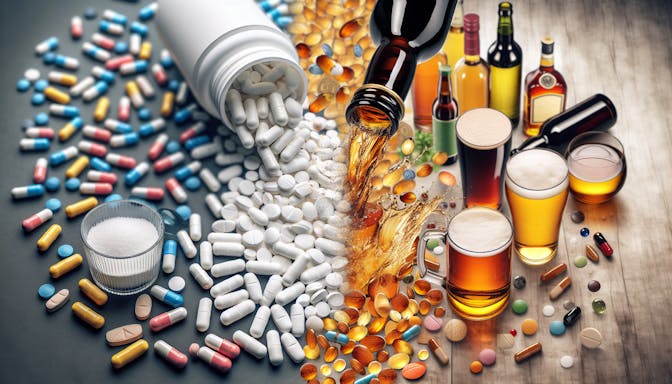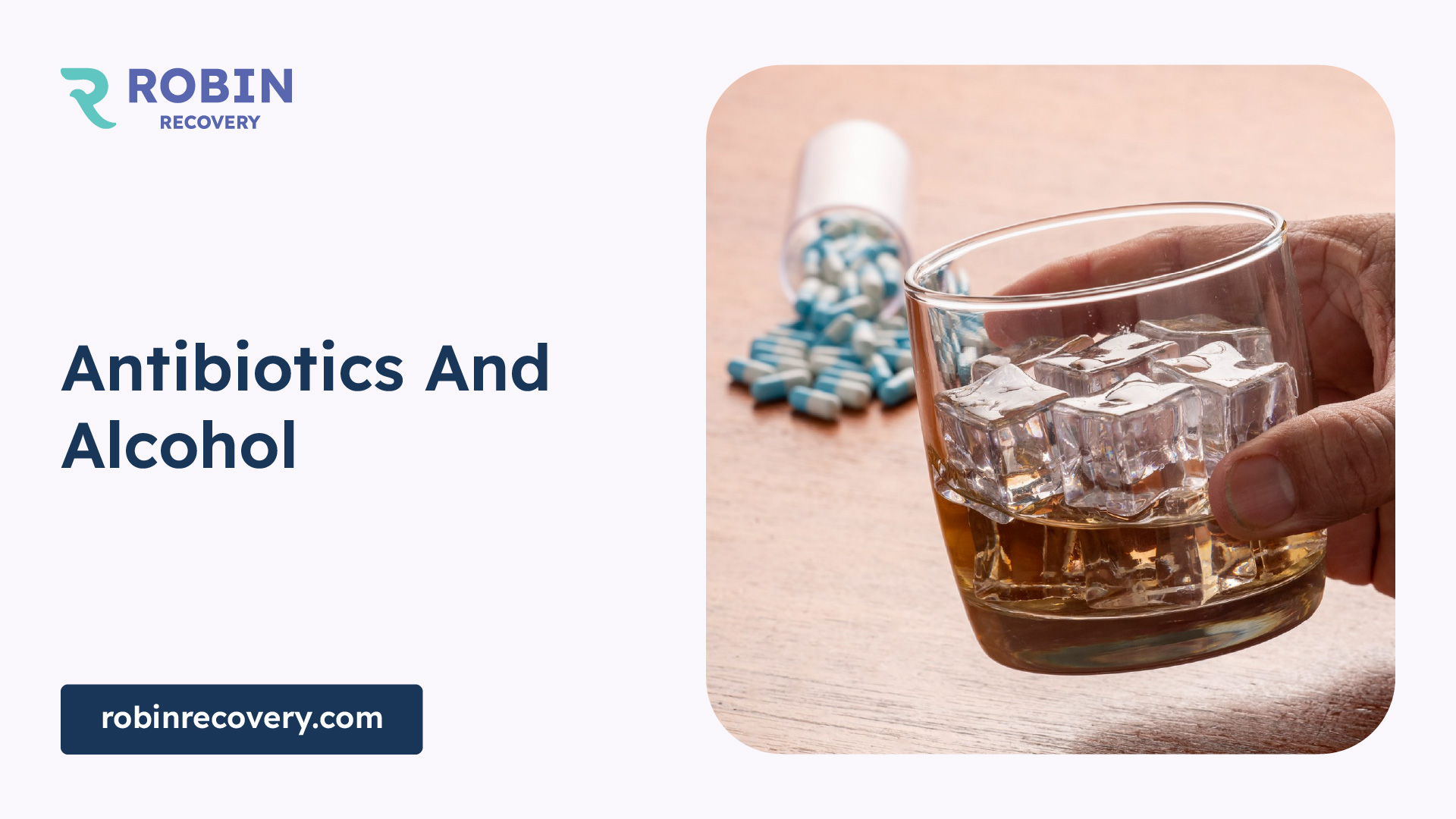Antibiotics And Alcohol

Alcohol and Antibiotics Overview
When it comes to understanding the interaction of alcohol and antibiotics, there are certain key points to keep in mind. The relationship between the two is complex and can vary based on the type of antibiotics being used and the amount of alcohol consumed.
Understanding the Interaction
Contrary to popular belief, alcohol doesn’t make most antibiotics less effective. However, consuming alcohol, especially in large amounts, might increase the chance of experiencing certain side effects associated with the antibiotic in use.

Certain antibiotics, such as Metronidazole, Tinidazole, Cefoperazone, Cefotetan, and Ketoconazole, should never be mixed with alcohol as it can cause a potentially dangerous reaction. Similarly, adverse effects can be observed when alcohol is consumed while taking Griseofulvin.
The usage of alcohol should also be avoided when taking Isoniazid and Linezolid antibiotics as it can lead to increased side effects. In the case of Doxycycline and Erythromycin, consuming alcohol may make these antibiotics less effective.
In general, doctors recommend avoiding alcohol while taking certain drugs to prevent interactions that might increase the risk of unsafe side effects.
Understanding the potential interaction between antibiotics and alcohol is crucial for ensuring proper medication usage and efficacy. It's always advisable to consult with a healthcare professional before consuming alcohol while on any medication, including antibiotics.
Antibiotics to Avoid with Alcohol
When it comes to mixing antibiotics and alcohol, caution needs to be exercised with certain types of antibiotics. Some antibiotics can cause severe reactions when combined with alcohol. This section explores three antibiotic types that should be avoided with alcohol: Metronidazole and Tinidazole, Cefoperazone and Cefotetan, and Ketoconazole.
Metronidazole and Tinidazole
Metronidazole and Tinidazole are types of antibiotics often used to treat various infections such as bacterial vaginosis, pelvic inflammatory disease, and certain types of parasitic infections. However, when these antibiotics are taken with alcohol, they can cause potentially dangerous reactions.
It's recommended not to drink alcohol before, during, or up to three days after taking these drugs. The reactions can include severe physical symptoms such as fatigue, headache, digestive issues, chest pain, and heart palpitations. It can also lead to severe conditions like bloody stool, intense stomach cramping, fever, vomiting, and liver damage.
Cefoperazone and Cefotetan
Cefoperazone and Cefotetan belong to the group of antibiotics known as cephalosporins. They are used to treat a wide range of bacterial infections. Similar to Metronidazole and Tinidazole, taking alcohol while on these antibiotics can lead to unpleasant reactions.
These reactions can include a rapid heart rate, flushing of the skin, headache, nausea, and vomiting. As such, alcohol should be avoided during treatment with these antibiotics and for 72 hours after the last dose.
Ketoconazole
Ketoconazole is an antifungal medication used to treat a variety of fungal infections. While not an antibiotic in the strictest sense, it's important to note that alcohol should still be avoided while taking this medication.
Mixing alcohol with Ketoconazole can lead to various side effects, including dangerous reactions, altered effectiveness of the medication, or specific side effects. These can include dizziness, severe nausea, vomiting, abdominal pain, and in severe cases, liver damage.
In conclusion, it's crucial to consult with a healthcare professional before consuming alcohol while on any medication, including antibiotics. They can provide guidance based on the specific medication and the individual's overall health status. This ensures the antibiotic's effectiveness is not compromised, and the risk of adverse reactions is minimized.
Adverse Effects of Mixing Alcohol
When it comes to mixing alcohol and antibiotics, it's important to be aware of the potential adverse effects. These can range from decreasing the effectiveness of antibiotics to causing an increase in side effects.
Impact on Antibiotic Effectiveness
Contrary to common belief, alcohol doesn’t make most antibiotics less effective. However, consuming alcohol, especially in excess, could potentially interfere with the effectiveness of certain antibiotics. For instance, taking alcohol with antibiotics like Doxycycline and erythromycin may make these antibiotics less effective.
Moreover, it's important to note that alcohol consumption should be avoided when taking certain antibiotics such as Metronidazole, tinidazole, cefoperazone, cefotetan, and ketoconazole. This is because alcohol can cause a potentially dangerous reaction when mixed with these antibiotics.
While research generally does not support the notion that antibiotics reduce the effectiveness of oral contraceptives, it's always best to consult with a healthcare provider to understand the potential interactions of any medication.
Risk of Side Effects
The risk of experiencing side effects from antibiotic use can increase if alcohol is also consumed. For instance, drinking alcohol while taking the antibiotic Griseofulvin can have adverse effects, and alcohol should also be avoided when taking Isoniazid and linezolid antibiotics as it can lead to side effects.
In general, the possible side effects of mixing alcohol and antibiotics can include:
- Nausea and vomiting
- Headache
- Dizziness
- Rapid heart rate
- Flushing (skin turning red)
These effects can vary depending on the specific antibiotic used, the amount of alcohol consumed, and individual health factors. As such, it's always best to consult with a healthcare provider before consuming alcohol while on an antibiotic regimen.
Understanding the relationship between antibiotics and alcohol is crucial to ensure the safe and effective use of these medications. Remember, when in doubt, it's always best to seek professional medical advice.
Importance of Following Guidelines
When it comes to the interaction of antibiotics and alcohol, it is crucial to adhere to the guidelines provided by healthcare professionals. These guidelines are designed to ensure the effectiveness of the medication and to prevent potential side effects.
Doctor's Recommendations
Medical practitioners provide recommendations on alcohol consumption based on various factors, such as the type of antibiotic prescribed, the patient's age, and overall health condition. For instance, drinking alcohol while on certain antibiotics like Metronidazole, tinidazole, cefoperazone, cefotetan, and ketoconazole can cause a potentially dangerous reaction. Therefore, it is advised not to consume alcohol before, during, or up to three days after taking these medications. Additionally, antibiotics such as Doxycycline and erythromycin may have their effectiveness reduced when mixed with alcohol.
It's essential to pay attention to the warnings on antibiotic labels concerning alcohol use. If unsure about the specifics of the medication, consulting with a doctor or pharmacist is highly recommended. If advised against drinking alcohol, adhering to this guidance can help avoid the effects of an alcohol-drug interaction.
Waiting Period After Antibiotic Course
Doctors usually prescribe antibiotics for a short duration. It is suggested that patients wait until the antibiotic course is completed before consuming alcohol. Avoiding alcohol while on antibiotics can help reduce complications or side effects associated with the medication. Moreover, it could potentially aid in recovering from the infection more quickly.
In essence, understanding the interaction between antibiotics and alcohol and adhering to the guidelines provided by healthcare professionals is key to ensuring the effectiveness of the treatment and safeguarding one's health. It's always best to consult a healthcare professional if there are any doubts or concerns.
Risks of Alcohol Consumption
While the combination of antibiotics and alcohol is most commonly known for its potential side effects, it's also important to consider how alcohol consumption can interfere with the overall healing process and nutrient absorption.
Disrupting Healing Process
When the body is healing from an infection, it's crucial to maintain optimal conditions for recovery. Alcohol consumption can disrupt these conditions, interfering with sleep patterns, increasing blood sugar levels, and lowering energy levels. All these factors can hinder the body's ability to heal from an infection, regardless of the effectiveness of the antibiotic treatment [1].
Moreover, consuming alcohol while taking antibiotics can increase the chance of experiencing certain side effects, making the recovery process even more challenging. It's generally recommended to wait until the antibiotic course is completed before consuming alcoholic drinks to avoid these complications.
Impact on Nutrient Absorption
Nutrient absorption is another important factor in the healing process that can be negatively impacted by alcohol. Alcohol can hinder nutrient absorption in the body, depriving it of the essential nutrients needed for recovery.
This disruption in nutrient absorption can lead to various health issues, such as malnutrition and immune system weakness, making it harder for the body to fight off infections. It's therefore advisable to avoid alcohol while taking antibiotics to ensure optimal nutrient absorption and promote faster healing.
In conclusion, while the interaction between antibiotics and alcohol can vary depending on the type of antibiotic and the amount of alcohol consumed, it's generally best to avoid alcohol during antibiotic treatment. This precaution ensures that the antibiotics can perform their function effectively, reduces the risk of side effects, and promotes a more efficient healing process. Always consult a healthcare professional if unsure about the potential risks and interactions.
Antibiotics and Alcohol Misconceptions
When it comes to mixing antibiotics and alcohol, there are many misconceptions that can potentially lead to adverse health effects. It's important to separate fact from fiction and understand the potential risks involved.
Common Myths and Realities
Myth 1: Drinking alcohol while taking antibiotics is safe
Contrary to the belief of many, combining alcohol and antibiotics is not safe. Alcohol directly inhibits the effectiveness of antibiotics and can cause various negative side effects, including gastrointestinal issues and hindering cognitive function [2].
Myth 2: Antibiotics can always handle infections on their own
While it's true that antibiotics are powerful medications that destroy or slow down the growth of bacteria, they often need assistance from the body's own immune system. If the body is weakened by alcohol, it can hinder the effectiveness of antibiotics and slow down recovery.
Myth 3: All antibiotics react the same way with alcohol
Not all antibiotics are the same. Mixing alcohol with certain antibiotics like Metronidazole, Linezolid, Sulfamethoxazole, and Trimethoprim can lead to severe physical reactions such as fatigue, headache, digestive issues, chest pain, and heart palpitations. It can also damage vital organs like the liver and kidneys [2].
Clearing up Misunderstandings
Understanding the interaction between antibiotics and alcohol is crucial to maintaining health and ensuring the effectiveness of the medication. Here are some important facts to bear in mind:
- Alcohol interference with antibiotics can slow down the healing process, increase the risk of infections, and contribute to severe side effects like vomiting, dizziness, drowsiness, headache, and potentially life-threatening seizures [2].
- While it might be tempting to have a drink while on medication, it's essential to avoid alcohol while taking antibiotics. Alcohol can interact poorly with the medications, cause severe side effects, and disrupt the body's natural healing processes.
- Alcohol should only be consumed once the antibiotic treatment is completed, and the body has received adequate rest and nutrition. Even then, it's important to consume in moderation and follow any specific advice from your healthcare provider.
By debunking these common misconceptions and misunderstandings, it's hoped that individuals will make informed decisions about their health. When in doubt, always consult a healthcare professional about the potential risks and interactions between antibiotics and alcohol.
References
[1]: https://www.healthline.com/health/antibiotics-alcohol
[2]: https://www.alcoholrehabguide.org/alcohol/drinking-drugs/antibiotics/
[3]: https://www.medicalnewstoday.com/articles/10278
[4]: https://www.bmj.com/content/337/bmj.a2885
[5]: https://www.theedgetreatment.com/antibiotics-and-alcohol/
